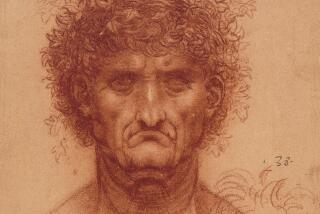JOSEPH BRODSKY / LENINGRAD: Fragments.<i> By Mikhail Lemkhin</i> .<i> Foreword by Czeslaw Milosz</i> . <i> Afterword by Susan Sontag (Farrar, Straus and Giroux: 208 pp., $35)</i>
- Share via
Susan Sontag, in “On Photography,” has called photographs “inexhaustible invitations to deduction, speculation, and fantasy.” So it is with Mikhail Lemkhin’s photo-poem, “Joseph Brodsky / Leningrad: Fragments,” a book that invites as much speculation and fantasy toward Brodsky as toward Leningrad itself. Forced into exile, Brodsky wrote about the city of his birth in his essay “Less Than One.”
“In the national experience, the city is definitely Leningrad; in the growing vulgarity of its content, it becomes Leningrad more and more. Besides, as a word, ‘Leningrad’ to a Russian ear already sounds as neutral as the word ‘construction’ or ‘sausage.’ And yet I’d rather call it ‘Peter,’ for I remember this city at a time when it didn’t look like ‘Leningrad’. . . . “
Lenin or Peter, the anthropomorphic cast of the memories of Brodsky is shared by another native son of the city. Lemkhin’s collection of photographs juxtaposes portraits of Brodsky with intimate and distant views of the city. He confesses that each of the 186 captionless black-and-white photographs dating from 1924 to 1991, from close-ups of the famous chain-smoker to medium shots of the entrance to his old apartment on the corner of Liteiny Prospect and Pestel Street, “is like a word or a phrase I use to tell my story, to sketch my subject’s portrait.” Lemkhin expresses the queasiness of limbo: “One can say that in some pictures we’re looking at his inside and in the others--on the outside; we are peeking into his consciousness and his past.”
Lemkhin’s photographs are well served by the guidance of the Virgil of Czeslaw Milosz and the Beatrice of Sontag, who ring the collection with an Introduction and an Afterword. Both repeat Brodsky’s famous quote that “a poet writes to please his predecessors, not his contemporaries.” One feels that Lemkhin must have been driven by a similar urge to please his predecessor and friend. His photos are “inexhaustible invitations” to a number of voyages, not just “to deduction, speculation, and fantasy” but to the sublime words of Brodsky and his predecessors.


